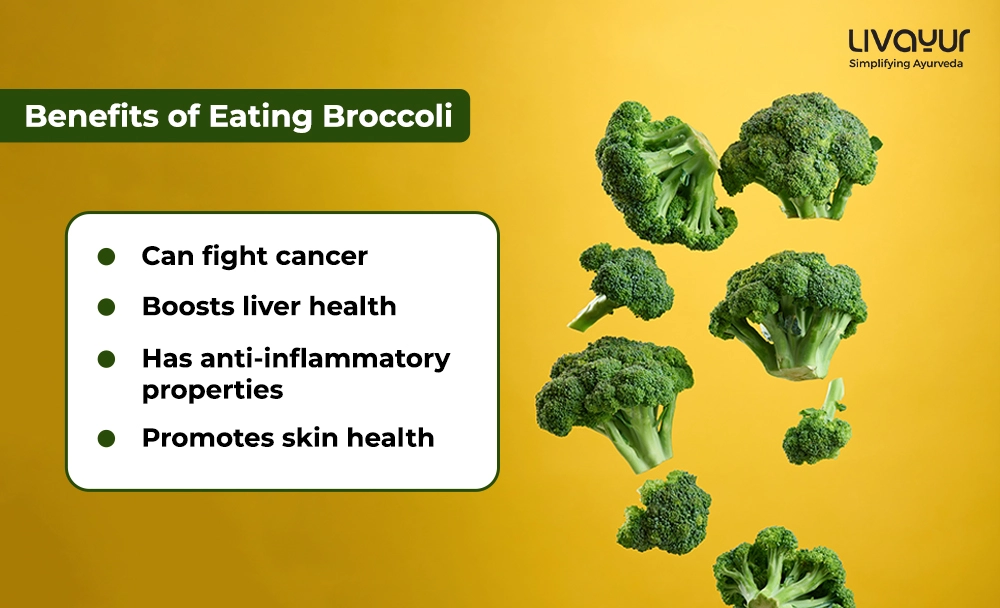
Broccoli is one of the most popular vegetables in the world. Scientifically termed Brassica oleracea, it is a member of the Brassicaceae family, whose other members include cabbage, cauliflower, kale, etc. Owing to the several nutrients present in broccoli, it is also touted as the “Crown jewel of nutrition.” [1]
Do you eat broccoli or want to start eating it? If yes, then keep reading to find out the health benefits of broccoli that make it one of the important vegetables. But first, let’s take a look at the nutritional value of broccoli:
Nutritional value of broccoli
The nutritional value that can be derived from 1 cup (100 g) of raw broccoli is as follows: [7]
| Component | Value |
| Calories | 39 kCal |
| Protein | 2.6 g |
| Carbohydrates | 6.3 g |
| Fibre | 2.4 g |
| Fat | 0.34 g |
| Vitamin C | 91.3 mg |
| Vitamin K | 102 μg |
| Folate | 65 μg |
Other than these important elements, Broccoli is also rich in minerals like calcium, iron, magnesium, phosphorous, potassium, etc.
Properties of broccoli [18]
Here are a few commendable properties of broccoli, which will persuade you to add broccoli to your diet, regularly:
1. Nutrient-Rich
As evident by the nutritional profile of broccoli, it is rich in many essential vitamins as well as minerals. Broccoli is an excellent source of vitamins C, K, and A. It also contains several important minerals, such as potassium, calcium, and iron. It is also rich in fiber.
2. Anti-Cancer
Broccoli is a member of the cruciferous family, which is known for its possible anti-cancer properties. It contains glucosinolates, which the body can convert into substances that fight cancer.
3. Anti-Inflammatory
Broccoli’s vitamin C content boosts collagen synthesis, wound healing, and iron absorption in addition to fortifying the immune system. It has been proven in various studies that substances like diindolylmethane and indole-3-carbinol, both found in broccoli, have a positive impact on the immune system. These compounds assist in controlling the immune response and lowering the inflammation.
4. Anti-Oxidant
Broccoli is a great source of several antioxidants, including β-carotene, vitamins C and E, and different types of flavonoids. Antioxidants are believed to lower the chance of acquiring chronic illnesses because they protect our cells from the damage caused by harmful free radicals.
5. Anti-Bacterial
Broccoli contains certain compounds such as glucosinolates and isothiocyanates that have displayed antibacterial activity.
The many health benefits of broccoli
1. Can fight cancer
Primary Benefits: Broccoli is rich in a biochemical compound called sulforaphane, which has anticarcinogenic properties. Several studies have also proven that broccoli can cause tumor suppression.[2]
Secondary Benefits: As such, broccoli may help prevent and treat cancer. [2]
2. Boosts liver health
Primary Benefits: Research has shown that broccoli helps reduce levels of liver enzymes, NAFLD (non-alcoholic fatty liver disease) scores and hepatic neoplasm formation. [3]
Secondary Benefits: Broccoli can therefore help slow down fatty liver disease and boost liver health. [3]
3. Has anti-inflammatory properties
Primary Benefits: Broccoli has shown potent anti-inflammatory effects that help fight inflammation. [9][10]
Secondary Benefits: Inflammation is a sign of several chronic autoimmune conditions, such as arthritis and type 1 diabetes. Therefore, broccoli may help prevent many of these diseases.
4. Prevents neurodegenerative disorders
Primary Benefits: Broccoli is rich in potent antioxidants and neuroprotective effects. [5]
Secondary Benefits: Broccoli can therefore help prevent and manage Alzheimer’s disease. [5]
5. Boosts gastrointestinal health [6]
Primary Benefits: Broccoli is not only rich in fiber but also antioxidants. Many studies have shown that chronic oxidative stress can delay the defecation process.
Secondary Benefits: Rich in both fiber and antioxidants, broccoli helps relieve constipation and improve overall gastrointestinal health.
6. Promotes skin health
Primary Benefits: Broccoli is rich in vitamin C, which helps the body produce collagen.
Secondary Benefits: It can, hence, help prevent skin damage, including wrinkling, as well as skin conditions like shingles and skin cancer. [7][8]
7. Helps manage diabetes
Primary Benefits: Apart from being rich in fiber, broccoli contains sulforaphane which helps manage blood sugar levels. [11][12]
Secondary Benefits: It can therefore help prevent and reduce the risk of type 2 diabetes.
8. Good for your cardiovascular health
Primary Benefits: Research suggests that a diet rich in cruciferous vegetables like broccoli can help lower the risk of atherosclerosis, a condition affecting the arteries in the heart. The credit for this effect mostly goes to the antioxidant content of broccoli, particularly sulforaphane. [13]
Secondary Benefits: Broccoli is also rich in potassium which is known to relax the blood vessels and lower the risk of high blood pressure, further benefiting cardiovascular health. [7][14] The fiber content of broccoli also plays a major role in preventing cardiovascular diseases. [15]
How to consume broccoli?
The florets, leaves, and stems of broccoli are all edible and can be used in various recipes. It can be steamed, stir-fried, boiled, or even prepared as a soup. [16]
Some broccoli recipes
1. Broccoli and cheddar baked potatoes
- Bake large potatoes.
- Steam broccoli, then mix it with cheddar, sour cream, salt, and pepper.
- Cut open the potatoes in the middle and stuff them with the marinated broccoli.
- Bake the potatoes stuffed with broccoli once more, garnish with chives and serve.
2. Broccoli and mushroom stir-fry
- Heat a pan, and pour some olive oil in it.
- Sauté garlic and ginger, then add mushrooms, broccoli, and red bell pepper to the mix.
- Stir-fry with soy sauce and sesame oil.
- Garnish with sesame seeds.
- Serve over rice or noodles.
3. Broccoli and cheese stuffed pasta shells
- Mix chopped broccoli, ricotta, mozzarella, parmesan, and egg.
- Stuff cooked pasta shells, and arrange in a dish.
- Top with marinara and mozzarella.
- Bake, and garnish with fresh basil. Serve it hot.
Side effects of broccoli [17]
Although broccoli is generally safe for consumption, some people might experience certain side effects. [4]
- Excess consumption of broccoli by people who smoke may increase the risk of lung cancer.
- As broccoli helps lower blood pressure levels, excess consumption may result in hypotension.
- Excess consumption of broccoli may also increase the risk of hemorrhagic stroke.
- Patients on blood thinners may experience bleeding due to the vitamin K content of broccoli.
- Broccoli may also alter iodine uptake and functioning of the thyroid gland and may cause hypothyroidism.
- Some people have also observed headaches, nasal congestion, wheezing and skin rashes after consuming broccoli.
- If you experience any such adverse reactions after eating broccoli, immediately contact a doctor.
FAQs
1. How can broccoli be incorporated into a daily diet?
Broccoli is versatile and can be enjoyed in various ways. The florets, leaves, and stems are all edible and can be steamed, stir-fried, boiled, or used in soups. Some delicious recipes include Broccoli and Cheddar Baked Potatoes, Broccoli and Mushroom Stir-Fry, and Broccoli and Cheese Stuffed Pasta Shells.
2. Is broccoli suitable for individuals with diabetes?
Yes, broccoli can be beneficial for individuals with diabetes. Its rich fiber content and the presence of sulforaphane may contribute to managing blood sugar levels. Including broccoli in the diet may help prevent and reduce the risk of type 2 diabetes.
3. What are the potential benefits of broccoli for skin health?
Broccoli is beneficial for skin health due to its rich vitamin C content, which supports collagen production. Collagen is crucial for maintaining skin elasticity and preventing damage, including wrinkling. The antioxidants in broccoli, such as β-carotene, vitamins C and E, also protect the skin from free radical damage. As a result, including broccoli in your diet may help prevent skin conditions like shingles and skin cancer, promoting overall skin health.
On a Final Note
Broccoli is one of the healthiest vegetables. Rich in antioxidants and anti-inflammatory properties, it helps prevent several diseases, including cardiovascular diseases, diabetes, cancer, etc.
Disclaimer
This article is written from a health and lifestyle perspective. The advice given here isn’t meant to replace professional medical advice. Please consult your health expert before making any dietary changes, as individual needs and allergies might vary.
References
- Influence of Extraction Method on Quality and Functionality of Broccoli Juice – PMC
- Sulforaphane targets cancer stemness and tumor initiating properties in oral squamous cell carcinomas via miR-200c induction – ScienceDirect
- Dietary Broccoli Lessens Development of Fatty Liver and Liver Cancer in Mice Given Diethylnitrosamine and Fed a Western or Control Diet – PMC
- Isothiocyanates are detected in human synovial fluid following broccoli consumption and can affect the tissues of the knee joint – PMC
- Sulforaphane Ameliorates Neurobehavioral Deficits and Protects the Brain From Amyloid β Deposits and Peroxidation in Mice With Alzheimer-Like Lesions
- Daily intake of broccoli sprouts normalizes bowel habits in human healthy subjects – PMC
- [HISTORICAL RECORD]: Broccoli, raw
- Role of Vitamin C in Skin Diseases – PMC
- Antioxidant and Anti-inflammatory Activities of Broccoli Florets in LPS-stimulated RAW 264.7 Cells – PMC
- Effects of long-term consumption of broccoli sprouts on inflammatory markers in overweight subjects.
- Sulforaphane reduces hepatic glucose production and improves glucose control in patients with type 2 diabetes | Science Translational Medicine
- Dietary Fiber Intake and Type 2 Diabetes Mellitus: An Umbrella Review of Meta-analyses – PMC
- Cruciferous and Total Vegetable Intakes Are Inversely Associated With Subclinical Atherosclerosis in Older Adult Women
- A Primer on Potassium | American Heart Association
- Dietary Fiber Is Beneficial for the Prevention of Cardiovascular Disease: An Umbrella Review of Meta-analyses – PMC
- Comparative Phytonutrient Analysis of Broccoli By-Products: The Potentials for Broccoli By-Product Utilization – PMC
- Sulforaphane in broccoli: The green chemoprevention!! Role in cancer prevention and therapy – PMC
- Broccoli: A Multi-Faceted Vegetable for Health: An In-Depth Review of Its Nutritional Attributes, Antimicrobial Abilities, and Anti-inflammatory Properties.




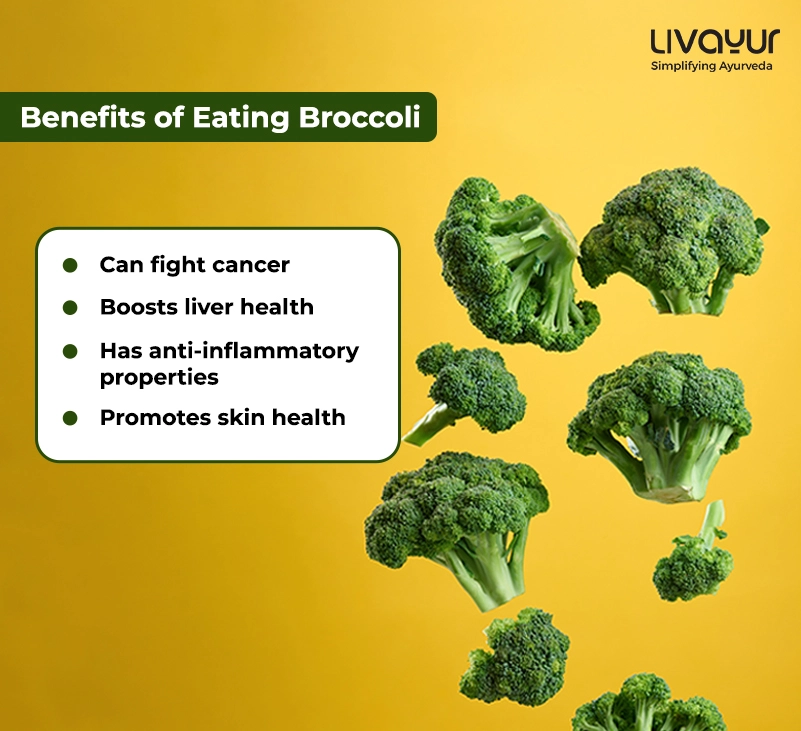









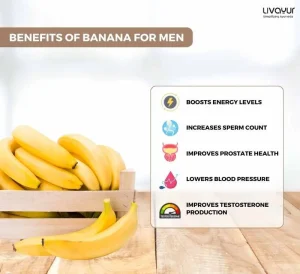
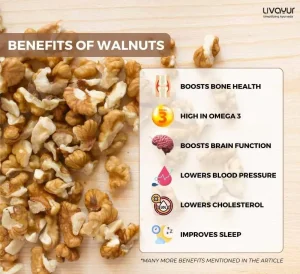
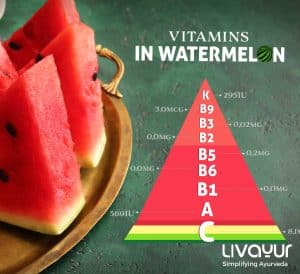
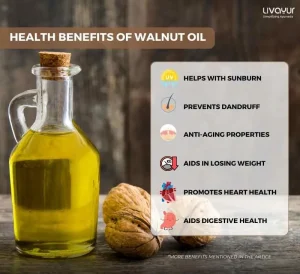
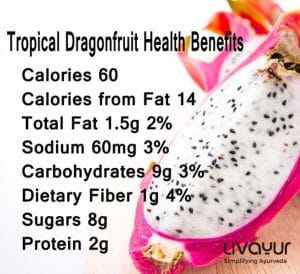






3 Comments